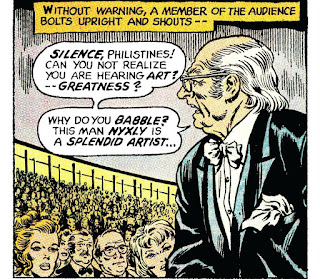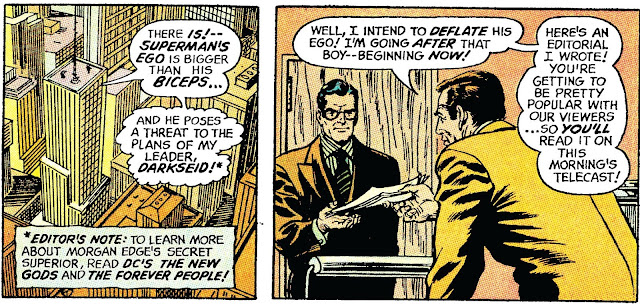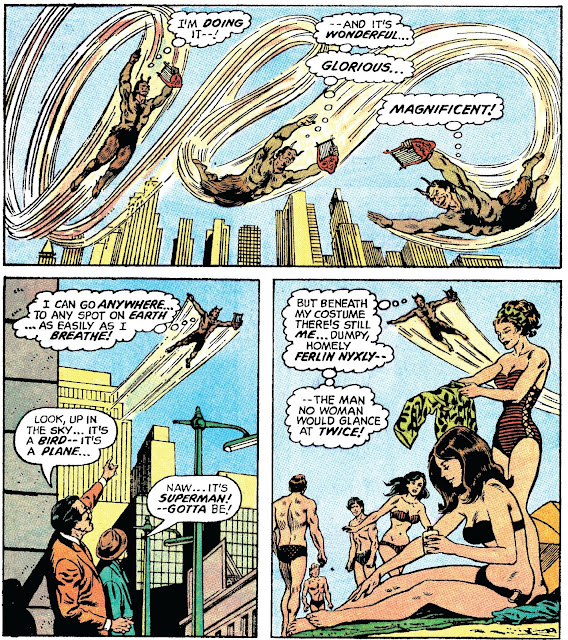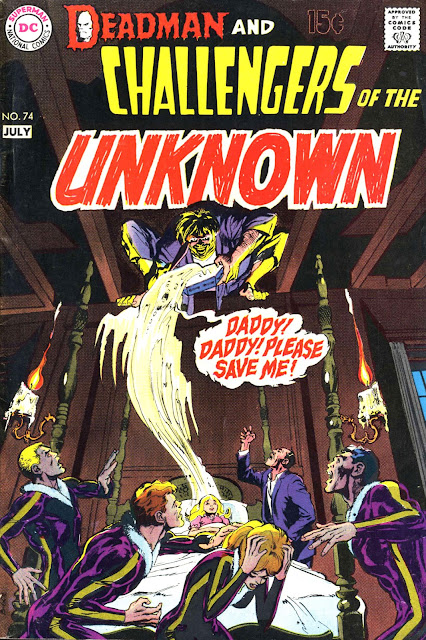SUPERMAN #235 March 1971
'Who is swifter... smarter... stronger... than Superman?' we are asked, as we see a demonic looking figure trouncing the Man of Steel in all three departments. 'Read the shocking, surprising answer in THE DEVIL'S HARP' we are instructed, and you'd be forgiven for thinking that our hero will be coming up against Old Nick himself this issue...
The truth behind the mystery of this Infantino/Adams cover is somewhat more mundane, in the true sense of the word, since the foe in SUPERMAN #235 is very much of this Earth and, disappointingly, no supernatural demon. The story does, however, feature a device that's straight out of a Horror title like HOUSE OF MYSTERY, but we'll get to that in good time. This issue continues the SUPERMAN NEVERMORE storyline begun two issues earlier, in which the disabling effects of kryptonite are neutralised and Superman finds his own powers waning mysteriously. We have also seen the formation and metamorphosis of a strange being resembling our hero but seemingly made entirely of sand.
In case you missed my previous writings on this storyline, they can be found by clicking on the covers below--
This episode, whose full title is SINISTER SCREAM OF THE DEVIL'S HARP, is again written by Denny O'Neil and drawn by Curt Swan and Murph Anderson. And what the cover claims to be a 'most bizarre exploit' opens with a splash-page which sees Clark Kent on a date with Lois Lane, at a Metropolis concert venue clearly modelled on the Hollywood Bowl. Poor old Clark, Lois really knows how to knock his self-confidence-- "I don't mind going out with you!" she offers, after grumbling about his choice of venue for their night out-- "Highbrow sounds aren't exactly me thing..."
As so often seems to be the case in such stories, the event the protagonists find themselves at is also attended by some kind of dignitary, usually from overseas. This story is no exception-- here the VIP is 'Prince Umbler' who is "making a good-will tour of the United States... trying to negotiate a loan for his country" says Kent, voicing, I'd imagine, O'Neil's cynical attitude to behind-the-scenes political bargaining.
And also, as so often seems to be the case in such stories, the dignitaries at these events are targeted by protestors, kidnappers or assassins, the latter being the case here--
And of course, as is always then the case in such stories, the protagonists get the chance leap into action, quickly adopting their superhero guise and saving the day. It's crowd-pleasing stuff of course, the writers ensuring that they always stick in an action sequence or two early on to appeal to the readers--
As the would-be assassins are transported away, Superman indeed feels the appreciation of an actual crowd-- and gets the chance to give Lois "a hasty wave", an innocent gesture that'll have more serious repercussions later--
At this stage in the story, however, it gives the acid-tongued Lois another chance to belittle Clark, effectively dismissing him as having "the personality of a suit of clothes hanging in an empty closet!" You have to wonder why he bothers with her...
So we turn to the story's antagonist-- the concert pianist Ferlin Nyxly, a man with a sinister secret and easily the best thing about this issue. O'Neil immediately engages us with this self-absorbed little man-- We see the low self-esteem often commonplace in great artists, frustrated not only be the audience's inattention to his playing, but also by his inner demons. "I'm a loser!" he muses, also labelling himself "a weak, forceless scholar".
But unlike those great performers whose perfectionism and dissatisfaction with themselves is tied up with the years of preparation, training and practice they have undergone to hone their talents, Nyxly's playing has developed in a very different way, as we are about to find out--
And here we enter HOUSE OF MYSTERY territory, as a green-tinted flashback sequence intriguingly reveals the secret of 'the Devil's Harp'-- it starts as Nyxly recalls his former position as museum curator and his desire to be a musician despite his acknowledged lack of talent-- The harp itself is decorated with a sinister demonic face, which, along with its lurid red colour, and the twisted notes and strange vapours seemingly emerging from it, would make most of us leave it where it is-- and Nyxly, frightened by the sounds it makes does indeed abandon it for the time being--
Again we see his negative opinion of himself, declaring himself to be "a weak, talentless failure" as he hunches over a piano, fingering its keys as he again considers his greatest desire, "to be able to sit and... play"--
In true Horror Anthology style, Nyxly finds himself mysteriously capable of playing "magnificently", clearly the beneficiary of some supernatural force related to the demonic harp, and an explanation as to his new-found career on the concert stage--
And O'Neil teasingly plays with his readers' loyalties, the pianist condemning Superman as "an idiot stuffed with muscle". We can't argue with the "muscle" bit, though "idiot" is a bit strong, and we can understand the performer's frustration at having his big moment spoilt. I for one have no problem in admitting that I probably have more in common with the piano-playing, under-confident character of Ferlin Nyxly than the muscular, assured Man of Steel, and I suspect many of the books readers did too in 1971, as well as today. So, despite suspecting that this peculiar figure will not work out to be a heroic character, the reader can't help but feel empathising with him, if only a little bit--
Similarly it's easy to agree with the audience member who suddenly stands up to admonish the audience for ruining the performance with their restless chattering. He declares Nyxly to be "a splendid artist" and voices the other man's frustration at the crowd's "babble"--
And when Kent's new boss, Morgan Edge seems to take a similar stance to Nyxly, criticising Superman for what he takes to have been "grandstanding" and calling him an "oaf" who is only good for "grabbing the spotlight" it's evident that O'Neil doesn't hold back from throwing a few brickbats at his leading characters as well as bouquets, just as he had demonstrated with his writing in GREEN LANTERN a year earlier. We know that Edge is fundamentally wrong, but there's a valid argument behind his prejudice about a superhero's true motivation (an argument also playing out in Marvel's IRON MAN and in SPIDER-MAN around the same time) and which would ultimately become par for the course in the years and decades to follow--
Of course, Edge is secretly working for Darkseid, DC's newest super-villain, as introduced by Jack Kirby in his multi-title Fourth World storyline. And his antipathy towards the Man of Steel is not simply annoyance that, as he puts it, his "ego is bigger than his biceps". In order to turn the Metropolis public against their resident superhero, he instructs Clark to read out a condemnation of Superman live on TV-- a brave detail on the writer's part, exposing the insidious influence media moguls might have on the editorial content of their output--
So we're treated to a lovely moment, Clark Kent being forced to present a public dismissal of his own alter-ego. I'd have loved this to have been the moment depicted on the cover, or even if the issue had ended with this as a cliff-hanger, it's potentially so powerful.
But an anti-climactic interruption to the broadcast saves the day and Kent races away to investigate the sighting of a mysterious object. This turns out to be the doppelganger formed from sand, and again Superman finds his powers diminish when he is close to the strange being--
Switching our focus once more to Ferlin Nyxly we find the under-confident pianist fiddling with the strange harp, obsessing over "that muscle-bag" Superman, and wishing he had the Kryptonian's power of flight--
No sooner has he uttered the words than he finds himself, indeed, endowed with that very super-power. And miles away both Superman and his double 'plummet toward the icy ocean below', their ability to fly seemingly taken away completely--
At this point the mystery of the demonic figure on this book's cover is revealed-- it is Nyxly himself, who elects to dress in an outfit as the "flying demigod" Pan, as puts his new-found ability to the test, leaping from an upper window of the museum--
There was something of a devillish theme going on around this time in the Super-books-- Not only had Superman's girlfriend seemingly got herself hitched to Satan on the cover of LOIS LANE a few months earlier, but the following issue of the title currently under the spotlight will also set up the notion of the Man of Steel winding up in Hell (I shall be looking at that issue quite soon)--
Nyxly finds the experience exhilirating, but his excitement is tempered by his feelings of unworthiness. Observing a group of young people below he bemoans the fact that despite this superpower he remains a "man no woman would glance at twice".
And witnessing the wealth of us he also reveals his resentment of them, claiming that he's "poor as a churchmouse"--
Unlike a traditional superhero, he chooses now to use his superpowers for ill rather than good. To help himself rather than to help others. I can well imagine that at this point in the story, Nyxly's decision to follow the path to crime might not be a complete surprise to all readers, but I do think that O'Neil's efforts to present him as a flawed man whose resentments get the better of him makes him a more defined character, and one we can't easily dismiss as simply 'evil'--
If anything there is more than a touch of Faustus in him, the devilish harp endowing him with abilities he was not born with simply because he asks for them. How many of us in his position wouldn't be the same? As a security man blasts him with a shotgun he begs the harp to make him "invulnerable"--
And indeed, that is what happens. As he climbs from the pit his fall has created, we witness the apotheosis of this intriguing character as he declares himself to be "a demigod-- Pan!"
As the cops' bullets rebound harmlessly off him we witness the transformation of this man, whom fate seems to have smiled on and briefly rewarded, into a "greedy", arrogant character-- a false god-- To emphasise that he should not be looked up to and respected like Superman, he is depicted from above, so that we are literally looking down on him and viewing him now with contempt--
Cutting back to our protagonist we find that Clark Kent's hand is scalded by some hot coffee spilt on him-- "That means... I've lost my invulnerability, too" he realises.
Meanwhile the devious Edge has insisted his network gives airtime to Nyxly, still dressed as Pan, allowing him to issue a challenge live on air directly to "egotistical braggart" Superman-- a "death-duel"--
In a powerful tryptich that zooms in on his brooding face, Kent concludes that Nyxly has taken his superpowers from him. Although he is obviously concerned that he has been robbed of his powers, we sense that the other man's taunts that Superman is a "coward" hurt him too. If he wasn't "grand-standing" at the concert at the start, then the prospect of "the whole world" seeing him defeated hits a nerve and it's as much about his public image as about his superpowers.
In response to Kent's questions as to how Nyxly has acquired his abilities, if he cast his mind back to the concert he might have seen a link too with Timos Achens, the man who'd stood up to admonish the crowd-- the man Clark had described as "the world's best pianist" until his musical talent mysteriously vanished six months earlier--
And so 'Pan' gets a second chance at a performance in front of the city's population, and this time it's Superman whom he intends to make look foolish while he triumphs. In a packed Metropolis Stadium we witness Nyxly robbing Superman of his super-speed--
Followed by his super-strength--
Rendering the Kryptonian completely powerless just as he realises the source of his opponent's ability to steal his powers--
It does not seem that Nyxly has any real desire for world domination or the usual motives for destroying Superman-- instead his actions seem rooted in resentment or jealousy-- he wants the Man of Steel to admit that his "soul is filled with pettiness... with cowardice!" This is as much about performance for him, before a huge crowd as anything else. He wants to belittle Superman, to make him lose not only his actual powers but also his reputation, to reduce him effectively to the position of insignificance he was himself in previously.
At that moment 'Superman's strange stalker' appears, deus ex machina, destroying the harp, allowing O'Neil a moment of poetic flourish, comparing the sound created in that moment to 'the death-scream of a mammoth'--
And he captures the enormity of the action by then describing 'an eternity that lasts but a few fleeting moments', as with the destruction of the harp Nyxly falls down, presumably dead, and Superman feels his powers returning. As Superman says, considering the broken instrument, "such a device could have been a great good", we are left wondering whether its owner was doomed from the start, whether his own resentments and dissatisfaction made his downfall inevitatble and whether in someone else's hands it might have had a more positive outcome.
Then as Superman, depicted looking upwards at his silent doppelganger recognises him to be "like a dark twin of myself", the strange being walks away leaving more questions unanswered and we are left with O'Neil's promise that this story has not ended, 'nor does it end happily'--
You can see all my January 2021 posts by clicking here--
My thoughts on the first 2 parts of the SUPERMAN story arc KRYPTONITE NEVERMORE and on Kirby's JIMMY OLSEN #136 and FOREVER PEOPLE #1 can be found by clicking the covers below--


































































Comments
Post a Comment